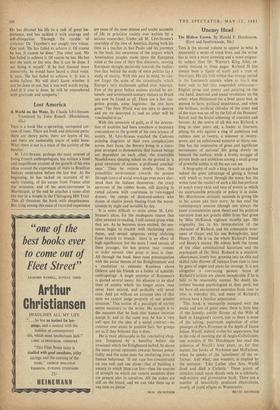Uneasy Head
The Hollow Crown. By Harold F. Hutchinson. (Eyre and Spottiswoode, 30s.)
THIS is the second volume to appear in what is apparently a series of royal lives, and the writer
has at once a more arresting and a more enigma- tic subject than Dr. Warren's King John, re- cently noticed in these pages. Richard II has always been a figure of myth and a crux of historians. His life falls within that strange period in the fourteenth century when so much was born only to fall into suspended animation— English prose and poetry and painting on the one hand, doctrinal and social revolution on the other; when Parliament for a brief space had, or seemed to have, political importance, and when the brilliant, artificial chivalry of the court and of the wars was set off by the foil of the Peasants' Revolt and the brutal scheming of courtiers and barons. At the centre of all this was Richard, a king at nine years old, a leader at fourteen, pitting his wits against a ring of ambitious and ruthless men at twenty, a widower at twenty- seven, and an unbalanced autocrat at thirty-one. One has the impression of great and significant movements of national life going slowly on beneath the surface, while a frothy struggle of private feuds and ambitions among a small group of powerful nobles is all the eye can see.
A biography of such a king in such an age has indeed the great advantage of giving a thread with which to travel through the maze, but the writer (and the reader) of such a life has perforce to watch every twist and turn of events in which no ascertainable principle or policy is at stake. Mr. Hutchinson certainly succeeds in giving life to his actors and their story; he has read' the contemporary sources (though not always the latest commentaries upon them) and his political narrative does not greatly differ from that given by Miss McKisack eighteen months ago. His originality lies in his interpretation of the character of Richard, and his consequent treat- ment of Gaunt and his son Bolingbroke, later Henry IV. He is on the whole Richard's friend and Henry's enemy. He rejects both the tyrant of the older constitutional historians and the psychopath of Dr. Steel. Richard is a sensitive, affectionate, lonely boy, growing into an able and skilful ruler thrown off balance from time to time by gusts of anger and plans for revenge. It is not altogether a convincing picture. Some of Richard's actions are almost inexplicable if he is held to be reasonably normal. No doubt his- torians become psychologists at their peril, but we have all encountered neurotics from time to time in everyday life, and many of Richard'i actions have a familiar appearance.
This book is necessarily occupied with the packs and sets of great ones; there is little hint of the homely, earthy flavour of the Wife of Bath or Langland's tavern, just as there is none of the aching, passionate aspiration of other passages of Piers Plowman or the depth of Dame Julian. Wyclif, indeed, makes his appearance, but in the role of morning star of Anglo-Catholicism; one wonders if Mr. Hutchinson has read the polemics of Wyclif's later years, or, for that matter, the books of Workman and McFarlane, when he speaks of the 'saintliness' of the re- former. And what, one wonders, is implied by the sentence : 'Like Luther after him, Wyclif lived and died a Catholic.' These points of criticism touch upon details only in a scholarly, well-written and provocative book. There are a number of beautifully produced illustrations, mostly of royal effigies at Westminster.
DAVID KNOWLES






































 Previous page
Previous page